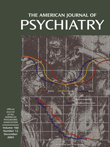Normal P50 Gating in Unmedicated Schizophrenia Outpatients
Abstract
OBJECTIVE: The hypothesis of a sensory gating defect in schizophrenia has been supported by studies demonstrating deficient auditory P50 gating in patients. P50 gating is the relative attenuation of P50 amplitude in the auditory evoked potential following the second auditory stimulus of a stimulus pair. METHOD: Auditory evoked potentials of 12 unmedicated male patients with schizophrenia and 24 healthy men were recorded during three runs of 40 click pairs. Three alternative waveform-processing strategies were used to analyze the data. RESULTS: Regardless of strategy used, the differences between subject groups regarding P50 amplitude and gating were nonsignificant. CONCLUSIONS: The P50 gating in the patient group was normal. The results do not support the concept of the P50 gating defect as a general trait marker of schizophrenia.



